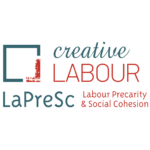Valeria Pulignano, Markieta Domecka, Karol Muszyński, Lander Vermeerbergen, Me-Linh Riemann. (2021). Creative labour in the era of Covid-19. In ETUI, The European Trade Union Institute.
This working paper identifies some key areas of policy intervention for advancing socially sustainable and fair solutions for freelancers working in the creative industries, who are among those have suffered the most from the economic fallout of the Covid-19 pandemic. In particular, the authors focus on those who work entirely on their own account, without employees (i.e. the ‘solo self-employed’), and who undertake project- or task-based work on a fixed-term basis. While demand for some services (e.g. ICT services, software development, digital communication, media, medical translation and audiobooks) has grown, due to their digital nature or essentiality in the post-Covid reality, other types of creative work have suffered due to increased competition, decreased demand, or because they were entirely put on hold due to the pandemic. National government policy measures aimed at cushioning the impact of Covid-19 on workers’ livelihoods proved necessary but insufficient to guarantee long-term protection. This is because the eligibility criteria for such support measures exclude many freelancers in the creative industries. Moreover, those who have been guaranteed access to national government support are often confronted with the complexity and length of the administrative proceedings which accompany the implementation of these measures. Finally, career development and employability are vulnerable areas for freelancers due to there being a lack of (or insufficient) national funds dedicated to these areas.
https://www.etui.org/publications/creative-labour-era-covid-19
